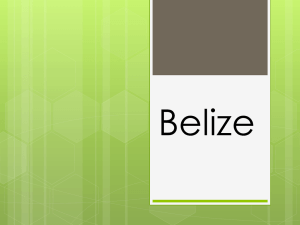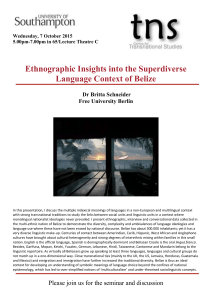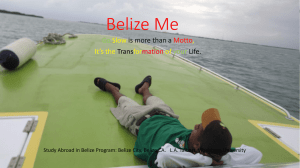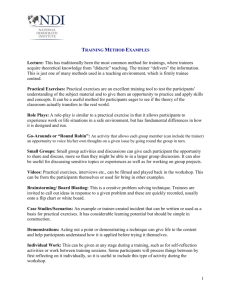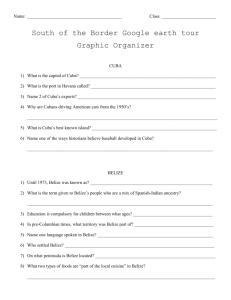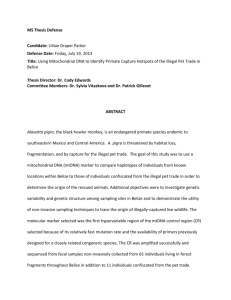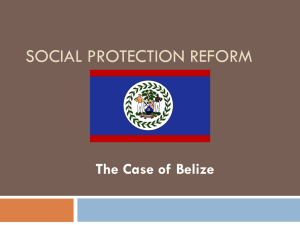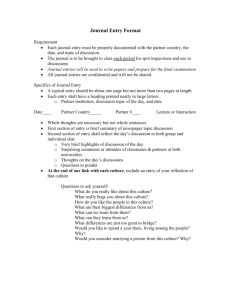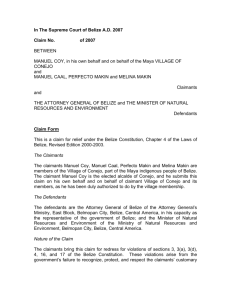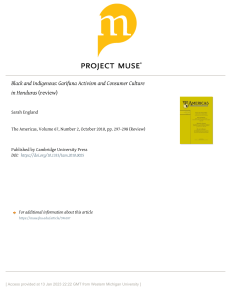here
advertisement
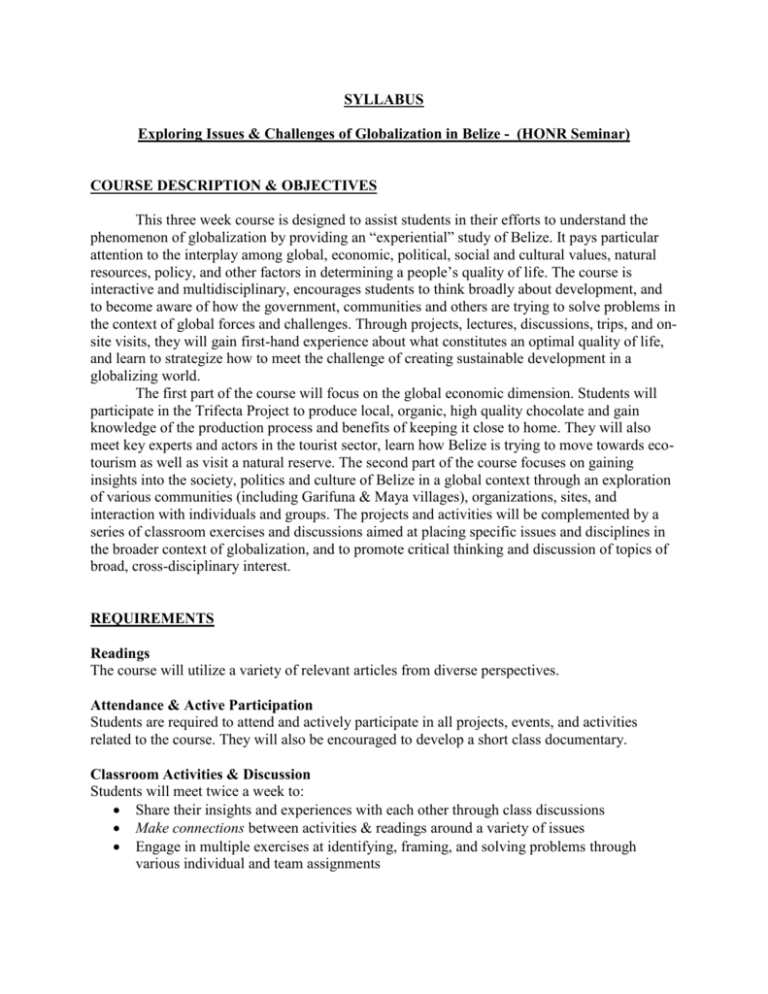
SYLLABUS Exploring Issues & Challenges of Globalization in Belize - (HONR Seminar) COURSE DESCRIPTION & OBJECTIVES This three week course is designed to assist students in their efforts to understand the phenomenon of globalization by providing an “experiential” study of Belize. It pays particular attention to the interplay among global, economic, political, social and cultural values, natural resources, policy, and other factors in determining a people’s quality of life. The course is interactive and multidisciplinary, encourages students to think broadly about development, and to become aware of how the government, communities and others are trying to solve problems in the context of global forces and challenges. Through projects, lectures, discussions, trips, and onsite visits, they will gain first-hand experience about what constitutes an optimal quality of life, and learn to strategize how to meet the challenge of creating sustainable development in a globalizing world. The first part of the course will focus on the global economic dimension. Students will participate in the Trifecta Project to produce local, organic, high quality chocolate and gain knowledge of the production process and benefits of keeping it close to home. They will also meet key experts and actors in the tourist sector, learn how Belize is trying to move towards ecotourism as well as visit a natural reserve. The second part of the course focuses on gaining insights into the society, politics and culture of Belize in a global context through an exploration of various communities (including Garifuna & Maya villages), organizations, sites, and interaction with individuals and groups. The projects and activities will be complemented by a series of classroom exercises and discussions aimed at placing specific issues and disciplines in the broader context of globalization, and to promote critical thinking and discussion of topics of broad, cross-disciplinary interest. REQUIREMENTS Readings The course will utilize a variety of relevant articles from diverse perspectives. Attendance & Active Participation Students are required to attend and actively participate in all projects, events, and activities related to the course. They will also be encouraged to develop a short class documentary. Classroom Activities & Discussion Students will meet twice a week to: Share their insights and experiences with each other through class discussions Make connections between activities & readings around a variety of issues Engage in multiple exercises at identifying, framing, and solving problems through various individual and team assignments Journal Students will be expected to keep a daily journal and reflect about their experiences, observations, etc. They will also be encouraged to take photographs. Final Report The report should include how students reflect personally and intellectually on their study abroad experience. What they have learned. How will they use that learning in their own life and in their chosen discipline? How will they take this experience back to the campus and their community there? They will also identify and develop a particular issue of interest for further research Evaluation/Grading Attendance & Participation In-class Activities & Discussion Journal Final Report 30% 25% 20% 25% COURSE OUTLINE INTRODUCTION & COURSE OVERVIEW Basic Facts & Overview of Belize: Historical, Social, and Global Context o Lecture & Discussion led by Local Expert Making the connections: Exploring the Local Area PART I: BELIZE & THE GLOBAL ECONOMIC ORDER Chocolate Production & Trading in the Global Economy o Trifecta Project: Student participate in a diverse range of activities related to all aspects of cocoa production o Discussions with key actors about natural resource conservation and organic farming Classroom Exercises & Discussions: Making the connections o Sustainable Agriculture: Challenges of Out-sourcing and “Free-Trade” o World Trading System and Development: Issues of Foreign Debt & poverty The Tourist Industry as the Backbone of the Economy: Towards Eco-Tourism? o Explore tourist areas o Meet and talk with key actors in tourist sectors o Visit to Eco-tourism site: Natural Reserve Classroom Exercises & Discussions: Making the connections o The Local Amidst the Global: “Economic Dependence” & Problems o Tourism and Development: Challenges of Eco-Tourism PART II: THE SOCIAL, CULTURAL & POLITICAL: Belize in a Global Context Population, Culture & Identity in a “Global World” o Lecture/Seminar by local expert(s) “Regional & Global Dynamics of Population Change” “The Cultures of Belize” o Explore the perspectives of and challenges faced by Maya and Garifuna peoples Meet with a non-governmental Maya Organization: (the Tumul K'in Center of Learning)? Visit a Maya community, traditional sites and ruins Visit a Garifuna community: (Hopkins Village)? Traditional Garifuna Punta dancing and drumming lessons Classroom Exercises & Discussions: Making the connections o Consequences of Globalization: Indigenous Struggles and Cultural Rights Connecting With the Youth: Exploring Similarities & Differences Across “Borders” o Meet with youth groups & leaders o Interactive sessions Challenges of Globalization: Role of Civil Society & NGOS o Discussions with representatives of community, national & international actors o Meet with Representatives from USAID, Peace Corps, U.S. Embassy Classroom Exercises & Discussions: Making the connections o Globalization and Quality of Life in Belize: Assessments & Conclusions
